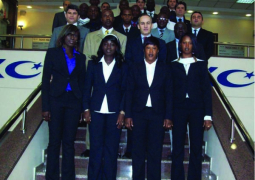A
two-day trade facilitation dialogue has just been held in The Gambia, under the
auspices of the Ministry of Trade and the ECOWAS Commission with support from
GIZ Germany Cooperation.
The
meeting focused on regional agreement to expedite the movement of goods across
borders, as well as to set out measures for effective cooperation between
customs and other appropriate authorities on trade facilitation and customs
compliance issues.
The
Gambia has a great stake in this as other member states do, which is why the
all-important regional workshop was held in Banjul.
Regional
trade facilitation and customs compliance are pertinent issues to talk about,
as they serve a great deal in making or breaking the trade growth and economic
development drive in African countries.
In
West Africa, for instance, trade between and among member states has been very
minimal. While trade among states in regions like Western Europe and North
America have a trade rate of between 40 and 60%, sub-Saharan African countries
have the lowest trade among themselves in the world, at the rate of 10%,
according to West African monetary institutions.
This
situation of low trade level among states in West Africa and Africa in general,
could be traced to several factors, among them are cumbersome customs
procedures and unfavourable procedural and administrative trade regulations
that aggravate the cost of doing business in The Gambia to facilitate trade.
Furthermore,
factors such as excessive document requirements, trade barriers revolving around tariff or non-tariff, poor
infrastructure, inefficient ports and low capacity, all work together to the
detriment of trade facilitation and growth and investments in the region.
We,
therefore, need to put in place measures that would efface all these
impediments to trade in West Africa.
“The
reforms that will accompany the full and effective implementation of the Trade
Facilitation Agreement will, no doubt, support trade development through more
simplified customs procedures which will improve access to global
markets,” Gambia’s director of trade
said.
The
Gambia’s effective implementation of the Trade Facilitation Agreement is, therefore,
an important aspect to improve national competitiveness, he added.
He
also said that over the years, The Gambia had made “significant progress in
simplifying procedural requirements for both import and export of goods”.
“We
have also seen recent investments by the Gambia Ports Authority all geared
towards building capacity to provide trade facilitation services more
efficiently and effectively. This has, no doubt, contributed to reducing the
cost of doing business in The Gambia.”
The
fact, however, remains that West Africa and, by extension, Africa must work in
unison to remove obstacles to trade to be able to reduce the cost of moving
goods from one place to another and as
well as to attract more lucrative investments in the region.
It
is vital to note that implementation of trade facilitation measures can reduce
the cost of moving of goods across borders, as well as boost investments,
manufacturing and the productive sectors of our economies.
“Regional trade facilitation and customs compliance are essential to our growth
and development. ”
The
Point
Read Other Articles In Article (Archive)
Arresting youths for playing football!
Aug 20, 2013, 11:33 AM




